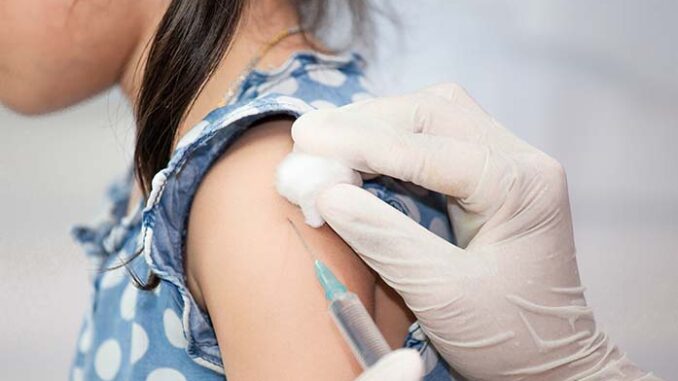
State officials said Tuesday they have been given federal approval to expand income eligibility for the state’s KidsCare program, a change that could add 10,000 children to the low-cost health care program run by the state.
They also said they got the green light to make permanent what started as a pandemic-era program to compensate parents who act as caregivers for their disabled children.
“When kids have access to affordable health care, it means more than just a healthier life,” Gov. Katie Hobbs said as she announced the changes Tuesday.
“It means better high school and college graduation rates. It means they’re more likely to find a good paying job, and it means they can grow up to reach their full potential without having to rely on Medicaid as an adult,” Hobbs said.
The changes would raise the income eligibility limit for the state’s Children’s Health Insurance Program – also called KidsCare – from the current 200% of the federal poverty level to 225%. That means a family of four earning up to $70,200 would be eligible to enroll their children, expanding eligibility to an additional 10,000 children in Arizona.
RELATED STORY: Parents of children with disabilities could be paid as caregivers under Arizona proposal
Hobbs’ office said the Legislature last year approved $5.5 million for KidsCare expansion in fiscal 2024 and $6.6 million in fiscal 2025 for the KidsCare expansion. But the change required approval from the federal government, which pays more than three-quarters of the program’s cost.
The state applied in November and the Center for Medicare and Medicaid Services gave its OK Friday. Arizona families can begin applying under the new rules on March 1, for coverage to start in April.
Also Friday, CMS approved the state’s request to make the Parents as Paid Caregivers program permanent. That program, which pays parents who provide direct care services to their children with disabilities, was originally designed to assist parents during the COVID-19 pandemic when it was hard to get outside care.
CMS granted a temporary extension of the program in October, before giving permanent approval last week. A Hobbs’ spokesperson said the state also allocated $133,100 last year in anticipation of making the program permanent.
“Reimbursing parents as paid caregivers is a step in the right direction and the right thing to do for children who need these critical services from those they feel the most comfortable with – their parents,” said Carmen Heredia, Cabinet Executive Officer for the Arizona Health Care Cost Containment System, the state’s Medicaid program.
The program is essential for Brandi Coon, whose 9-year-old son Tyson was diagnosed with cerebral palsy, epilepsy and traumatic brain injury after contracting bacterial meningitis as a baby.
“As Tyson’s mom, I am both his parent and his caregiver,” Coon said at Tuesday’s news conference. “Those roles interweave constantly.”
Coon said an average day of caring for Tyson entails caring for his physical needs, including preparing medications, food and water for his feeding tube. She takes him to a microschool, where he “loves to do hard things with age-appropriate learning curriculum, with modifications to help him succeed academically and socially.”
Coon co-founded the Raising Voices Coalition in 2021 to advocate for family caregivers and push for the program to become permanent. She said after a failed online petition, the group began “meeting with experienced advocates, disability organizations, and state leaders.”
“After hearing that a permanent program was not a feasible option – many times – we persevered in growing our grassroots advocacy community of parent caregivers, gathering data and building relationships with elected officials in order to have our voices heard,” she said.
After AHCCCS applied with CMS to make the program permanent, Coon said the coalition “submitted hundreds of public comments where we shared with AHCCCS our personal experiences, recommendations, and feedback regarding their proposal.” That pushed AHCCCS to amend the proposal and expand the scope of disabilities that would be covered by the program.
RELATED STORY: Affordable Care Act enrollment hit record highs in Arizona, U.S. in 2023
The KidsCare program is a low-cost health care program run by the state, that offers care to families that earn too much to be eligible for Medicaid. Families in the program pay a premium for health care, but it is limited to $50 a month for one child and $70 a month for two or more.
Hobbs Tuesday referenced the fact that Arizona cut its CHIP program during the Great Recession, before restoring it in 2016.
“For years Arizona was the only state in the country without a Children’s Health Insurance Program,” Hobbs said. “Thankfully, bipartisanship prevailed.”
But the CHIP program was still anemic when Hobbs was elected. Arizona ranked 49th among 50 states and the District of Columbia for its share of uninsured children in 2022, according to a Georgetown University report. It said 8.4% of children in the state did not have health insurance that year, with communities of color significantly outweighing whites in rates of uninsured children.
“As Arizona continues to grow, this is a smart investment that will protect our collective futures,” Hobbs said Tuesday.
